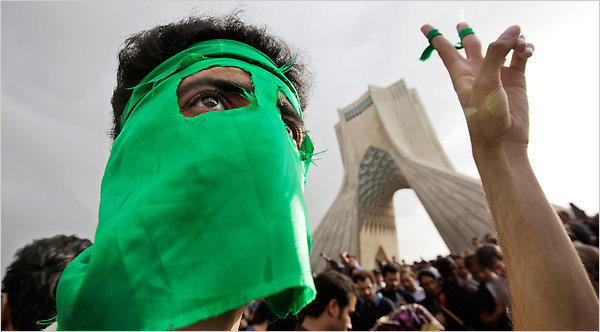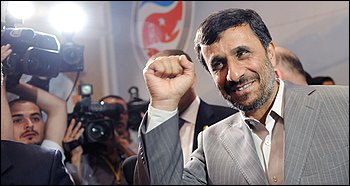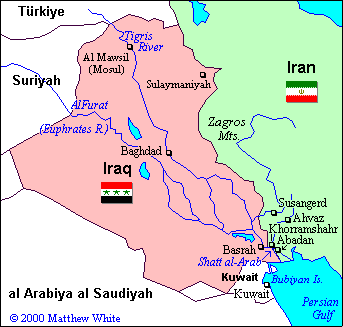
Summary news analysis piece in NYT a year later.
Iran has changed since the political crisis of June 12, 2009.
In scores of interviews conducted over the past several months with Iranians from all strata of society, inside and outside the country, a clear picture emerged of a more politically aware public, with widened divisions between the middle class and the poor and — for the first time in the Islamic republic’s three-decade history — a determined core of dissenters who were opposed to the republic itself.
The political grievances have merged with more pragmatic concerns, like high unemployment and double-digit inflation, adding to the discontent.
“I was on the bus the other day and there was a man, you would not believe the kind of information he had,” said a 59-year-old who works for the government. “He started to talk about the foreign currency reserves of different countries and began to criticize the government.”
Mr. Ahmadinejad and his patron, the supreme leader, Ayatollah Ali Khamenei, are stronger today than they were a year ago, political experts say, although their base of support has narrowed.
They are relying heavily on force and intimidation, arrests, prison terms, censorship, even execution, to maintain authority. They have closed newspapers, banned political parties and effectively silenced all but the most like-minded people. Thousands of their opponents have fled the country, fearing imprisonment.
As a formal political organization, the reform movement is dead.
All pretty much know--unfortunately.
Now for the change:
The crisis accelerated and institutionalized a transfer of power that began with the first election of Mr. Ahmadinejad in 2005. The shift was from the old revolutionaries to a generation that came of age during the eight-year war between Iran and Iraq, hard-liners who deeply resented the relatively liberal reforms promoted by former President Mohammad Khatami.
The vanguard of the new political elite is now the Islamic Revolutionary Guards Corps, which oversees Iran’s nuclear and missile programs and has extended its control over the economy and the machinery of state. It has improved its ability to control the street, to monitor electronic communications and keep tabs on university campuses, and its alumni head the government’s security organs.
This is the key thing to understand: the new generation is not the original revolutionary one led by the mullahs, who now serve more at the pleasure of the Guards than the other way around. It is the Iran-Iraq War generation, and here's where the comparison to Brezhnev's crew in the USSR is salient.
These guys want their sacrifice recognized and rewarded. They're survivalists, not ideologues. Their quest is regime survival, not revolutionary fervor. They see nukes providing them global recognition for their deeds, safety for their regime, and a means enabling Iran's continued rise as a great power--along with energy.
This package is not new to us, nor is it unique. We have the tendency to swallow its propaganda and remember its motives in the past tense, and this hobbles our thinking.
For now, the nukes are perfect for Iran: gets everyone talking that vice the regime-v-opposition, keeps the whole Islam-v-Israel thing up front, plays to national honor, etc. So long as it's just Israel as counterparty, there's no danger of negotiations being forced upon Iran.
But once that twosome is joined, most likely in rapid time by Saudi Arabia and/or Turkey, then the international pressure by great-power patrons will be intense.
And when Iran starts having to talk with the devil, just like the Sovs did in their own quest for global recognition, the revolution is extinguished for good, because revolutions cannot survive such deals with "unplacable foes."
So everybody thinks nukes locks Iran into all sorts of new power, when it's the other way around. Nukes will be no more usable for Iran than they've been for anybody else.
In the end, nukes will be the Revolutionary Guards' undoing, just like the Sovs.
The USSR cuts its first nuke deal in 1972, and 17 years later the Wall falls. It'll be a much shorter timeline with Iran.
 Saturday, July 17, 2010 at 12:06AM
Saturday, July 17, 2010 at 12:06AM  A WAPO story that only long-time aficionados (I confess) of Fox TV will celebrate.
A WAPO story that only long-time aficionados (I confess) of Fox TV will celebrate. 




























